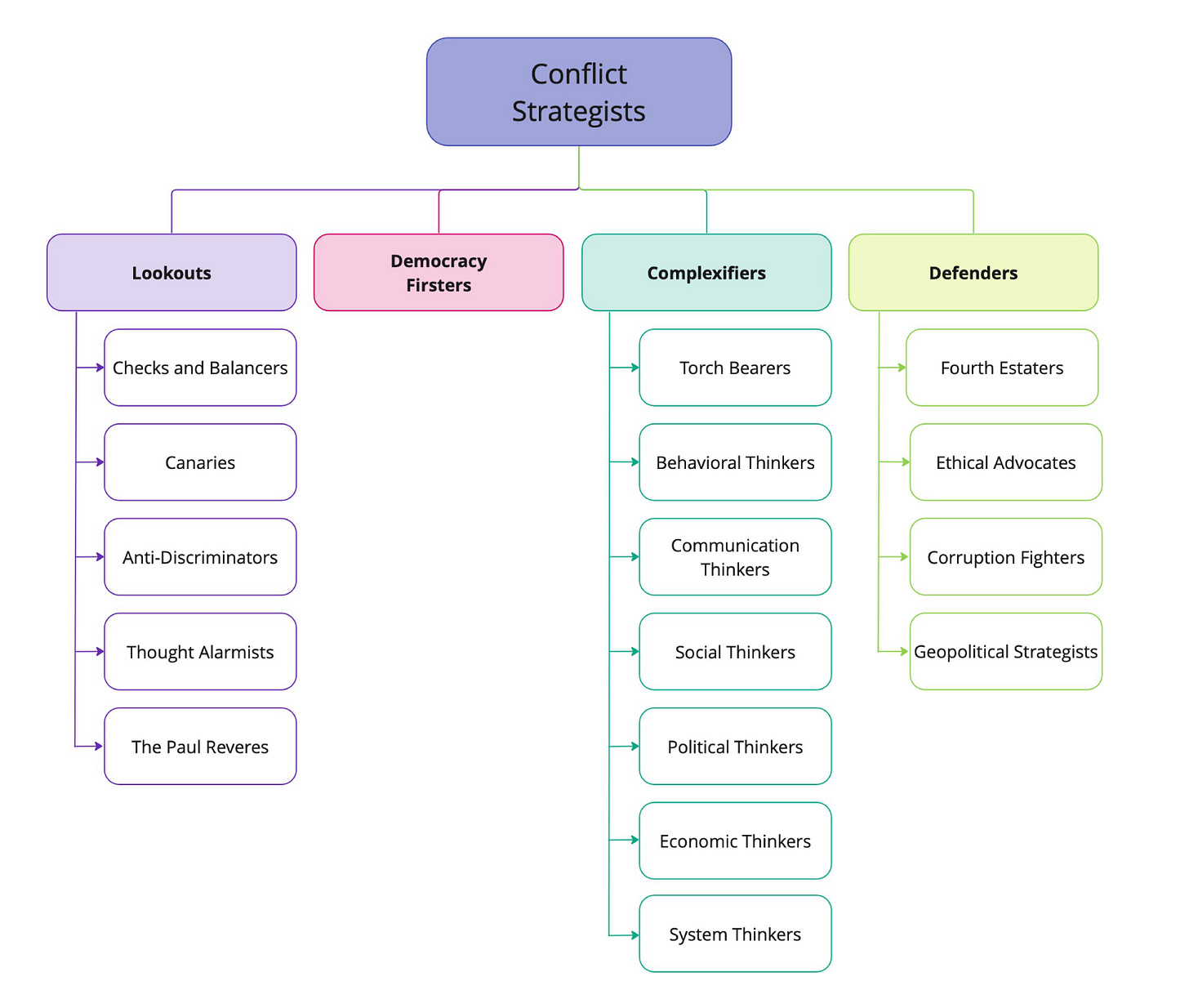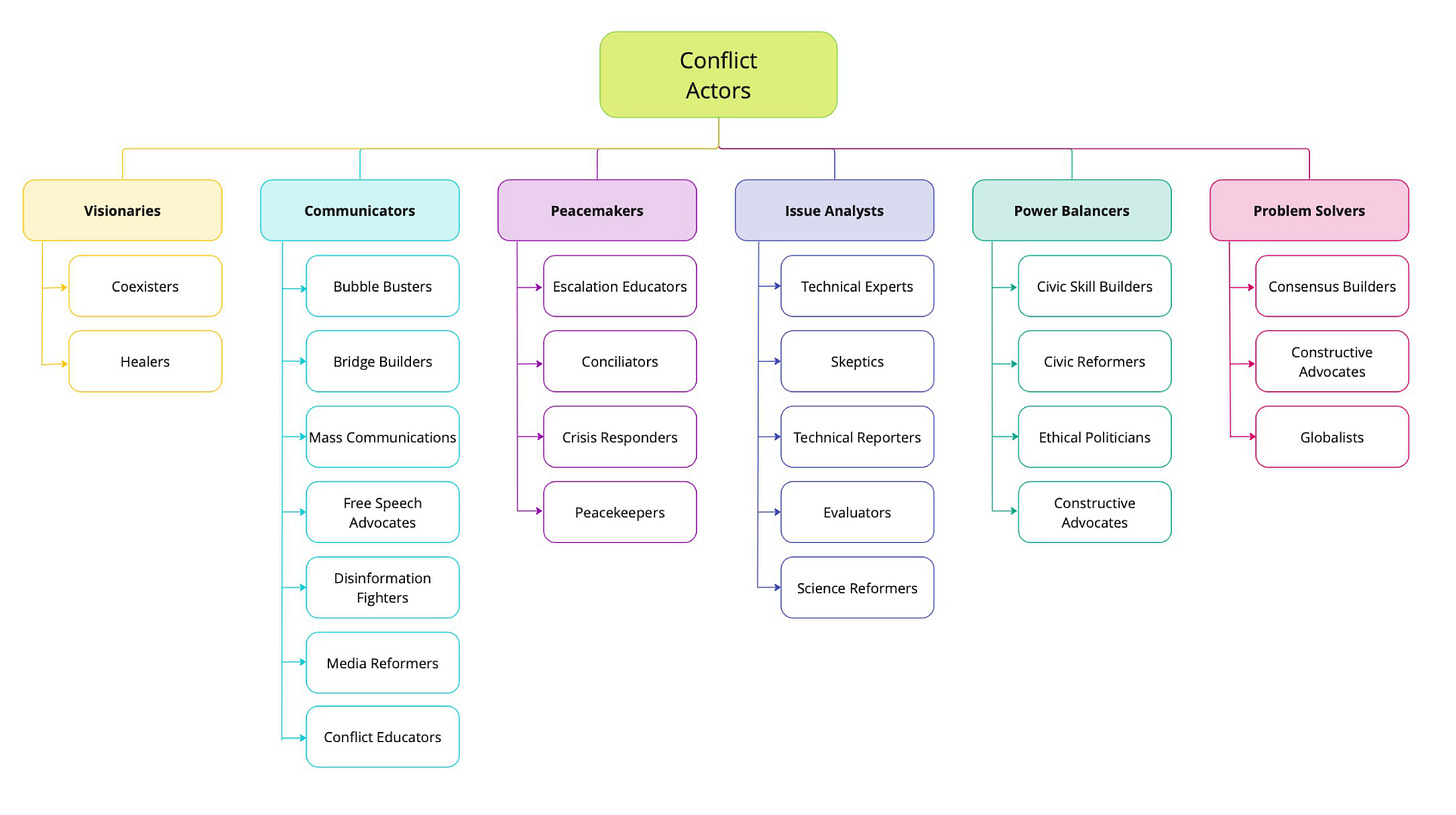40 Roles that Make Democracy Function - BCB #83
A map of the things that have to happen to make democracy peaceful, fair, and effective.
Healthy democracies require attention to a wide array of problems, and this effort is not something that can happen in a top-down way, say Guy and Heidi Burgess from Beyond Intractability. They call this concept “massively parallel peacebuilding,” and have mapped out 40 different roles that all work towards better conflict.
[Peacebuilding] involves thousands or even millions of people, performing many different roles in different places and contests, which, all done roughly at the same time, can bring about significant social, political, and economic change.
The Burgesses elaborate on this concept in this thirty-minute talk. They stress that all these roles are activities that people are already doing, not theoretical ideas. These include roles that we often talk about, such as journalists who are “communicators,” but also many less obvious but equally important functions, such as “issue analysts,” “skeptics,” and “healers.”
We really liked this approach, so we decided to visualize their taxonomy (click for larger).
At the broadest level, we have “conflict strategists,” who understand the big picture and figure out what needs to happen, and “conflict actors,” who take the actions to get it done.
The Burgesses break “conflict strategists” into four types: “lookouts,” “democracy-firsters,” “complexifiers,” and “defenders.” The other top-level category of “conflict actors” is similarly divided into “visionaries”, “communicators”, “peacemakers”, “issue analysts”, “power balancers”, and “problem solvers.” Each of these has its own sub-roles.
There are many recognizable roles here. This includes journalists (“mass communicators”), activists of various stripes (“constructive advocates”, “fourth estaters”) and people concerned with social justice issues (“anti-discriminators”, “ethical advocates”). But there are also many roles that usually get a lot less attention, thought, and resources.
People working on election integrity, like the loose coalition of organizations which formed around the 2020 election, are “democracy firsters … folks who understand that our ability to solve any problem depends on the health of democracy.” We’d all agree that the country needs more “ethical politicians.” And by articulating all of these roles, the Burgesses themselves are acting as “systems thinkers.”
We’ve previously covered people in many of the more obscure roles. Amanda Ripley is quite explicitly a “complexifier,” as is IFIT with their analysis of narrative diversity. Tangle editor Isaac Saul is a key “bubble buster” with his unusually bipartisan audience. We’ve mentioned Arnold Kling, who could be called a “skeptic,” constantly questioning mainstream views. We sometimes cover “free speech advocates” like Greg Lukianoff. In some sense all of these people are working towards the same goal, but in very different ways – and often from very different political positions.
Where does the Better Conflict Bulletin itself fit in? We are clearly “communicators,” but perhaps even more so “issue analysts” and “escalation educators.” We are “bubble busters” and “problem-solvers” engaged in “consensus building” between Red and Blue, and sometimes “lookouts” who raise the alarm. Like many people concerned about the American conflict, we play different roles at different times. What roles do you play, and what would you add to these categories?
Quote of the Week
All of these groups have to learn how to bridge theory and action, so that the things that the actors are doing actually make good sense in theory. It's easy to just start acting without being sure quite what you're trying to accomplish. There's a continuing need for evaluation and assessment and improving all of these efforts. [We need] education and training so new people that are getting involved have the kind of background that they need to work effectively, building institutions, and above all, finding the funding needed.
Image prompt: A minimalist, sepia-toned, image of democracy superheroes fighting for democracy from different parts of society, including journalists, professors, judges, and activists.





